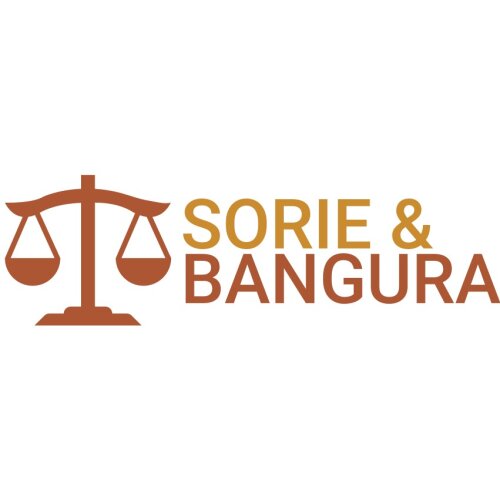Best Tax Increment Financing Lawyers in Sierra Leone
Share your needs with us, get contacted by law firms.
Free. Takes 2 min.
Or refine your search by selecting a city:
List of the best lawyers in Sierra Leone
About Tax Increment Financing Law in Sierra Leone
Tax Increment Financing (TIF) is a public financing method that is used as a subsidy for redevelopment, infrastructure, and other community-improvement projects within a designated area. In Sierra Leone, TIF is utilized by municipal governments to catalyze economic development in underdeveloped or struggling areas by allocating future increases in property taxes to pay for improvements. The approach is relatively new in Sierra Leone and entails complex legal and financial structures to ensure compliance and efficiency.
Why You May Need a Lawyer
Legal assistance is often crucial for navigating the complex processes involved in TIF projects. Here are common situations where legal help might be required:
Project Planning and Development: Ensuring that the TIF project aligns with local and national regulations.
Contract Drafting and Negotiation: Lawyers can help draft and negotiate contracts with developers, contractors, and government entities.
Compliance and Regulatory Issues: Handling compliance with tax laws, environmental regulations, and other legal requirements is vital.
Dispute Resolution: Legal professionals can assist in resolving disputes that may arise between stakeholders.
Litigation: In cases where litigation is unavoidable, having legal representation is crucial for defending your rights and interests.
Local Laws Overview
Several key aspects of local laws are particularly relevant to TIF in Sierra Leone:
Development Ordinances: Local ordinances may specify how TIF projects are implemented, including zoning laws and land-use regulations.
Taxation Laws: Understanding local tax laws is essential, as the success of a TIF depends on the capture of tax increments.
Environmental Regulations: Projects must adhere to environmental standards to ensure that development is sustainable and eco-friendly.
Public Financing Rules: Compliance with public financing rules to ensure proper management of funds.
Frequently Asked Questions
1. What is Tax Increment Financing?
Tax Increment Financing is a method to finance community projects through anticipated future increases in property taxes within a designated area.
2. How does TIF benefit communities?
TIF encourages investment in infrastructure, boosts economic development, and enhances property values within the area.
3. Who can initiate a TIF project?
Typically, local governments or municipalities initiate TIF projects, often partnering with developers or private entities.
4. Are there any risks associated with TIF?
Yes, risks include project failures that lead to less tax increment, disagreements among stakeholders, or legal non-compliance.
5. Can TIF be used for any kind of project?
No, TIF is generally used for projects that benefit public infrastructure and community development.
6. How is the base tax level determined?
The base tax level is determined by assessing property tax values at the time of the TIF designation.
7. What happens if the TIF area does not generate the expected tax increment?
This could result in financing shortfalls. Strategy adjustments or additional funding sources may then be required.
8. Is TIF beneficial for investors?
Yes, investors can benefit as TIF projects can enhance property values and improve local economies.
9. Are there alternatives to TIF?
Yes, alternatives include municipal bonds, public-private partnerships, and grants.
10. How is community input considered in TIF projects?
Community input is typically sought through public meetings and ongoing consultations to ensure projects align with community needs.
Additional Resources
Several resources can be beneficial for those seeking further information on TIF in Sierra Leone:
Ministry of Finance: Responsible for fiscal policy and may provide resources on TIF regulations.
Sierra Leone TIF Association: A national body that provides information and resources on TIF initiatives.
Local Government Departments: Municipal departments may have specific TIF guidelines and frameworks available.
Legal Firms Specializing in Public Finance: These firms can offer expert legal advice on TIF projects.
Next Steps
If you require legal assistance with a TIF project, consider taking the following steps:
Research Legal Firms: Look for firms with a specialization in public finance or development law.
Consultations: Schedule initial consultations to discuss your project and understand potential legal needs.
Engage Stakeholders: Engage with other stakeholders to ensure their understanding and involvement in legal processes.
Document Everything: Keep thorough records of all agreements, communications, and changes related to your TIF project.
Lawzana helps you find the best lawyers and law firms in Sierra Leone through a curated and pre-screened list of qualified legal professionals. Our platform offers rankings and detailed profiles of attorneys and law firms, allowing you to compare based on practice areas, including Tax Increment Financing, experience, and client feedback.
Each profile includes a description of the firm's areas of practice, client reviews, team members and partners, year of establishment, spoken languages, office locations, contact information, social media presence, and any published articles or resources. Most firms on our platform speak English and are experienced in both local and international legal matters.
Get a quote from top-rated law firms in Sierra Leone — quickly, securely, and without unnecessary hassle.
Disclaimer:
The information provided on this page is for general informational purposes only and does not constitute legal advice. While we strive to ensure the accuracy and relevance of the content, legal information may change over time, and interpretations of the law can vary. You should always consult with a qualified legal professional for advice specific to your situation.
We disclaim all liability for actions taken or not taken based on the content of this page. If you believe any information is incorrect or outdated, please contact us, and we will review and update it where appropriate.
Browse tax increment financing law firms by city in Sierra Leone
Refine your search by selecting a city.












